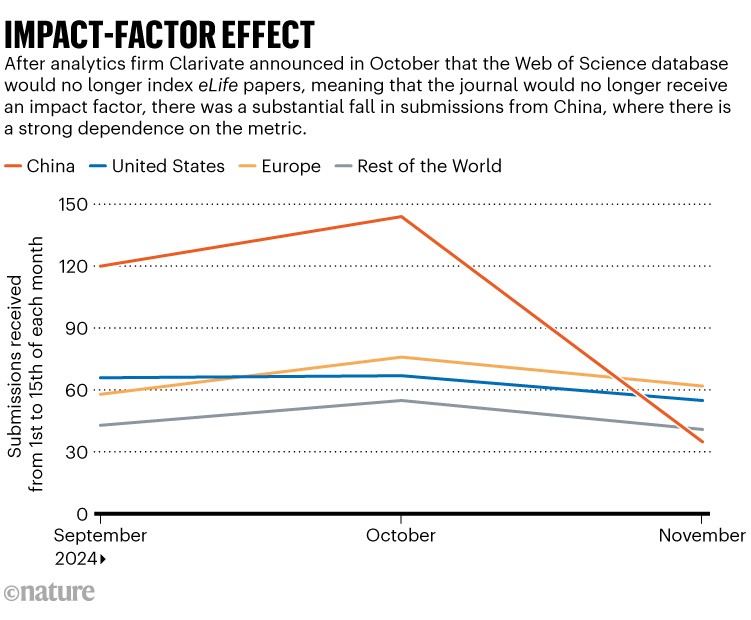Hello Nature readers, would you like to get this Briefing in your inbox free every day? Sign up here.

Hydroxychloroquine is used to treat malaria and was tested as a treatment for COVID-19.Credit: George Frey/AFP via Getty
A study that stoked enthusiasm for the now-disproven idea that the malaria drug hydroxychloroquine can treat COVID-19 has been retracted — more than four-and-a-half years after it was published. The paper, withdrawn because of concerns about the ethical approval for the research, is the second-most-cited retracted paper of any kind. Its withdrawal marks the 28th retraction for co-author microbiologist Didier Raoult, who has since retired. “This is incredibly good news,” says scientific-integrity consultant Elisabeth Bik. “This paper should never have been published — or it should have been retracted immediately after its publication.”
Nature | 7 min read
Reference: International Journal of Antimicrobial Agents paper (retracted)
The widening political divisions in the United States are partly down to campaign strategies that amplify our hard-wired instinct to come together — and exclude others. “We wouldn’t have civilizations if we didn’t create groups,” says political scientist Lilliana Mason. “We are designed to form groups, and the only way to define a group is there has to be someone who’s not in it.” ‘Out-group’ hatred could be further amped up by the country’s winner-take-all presidential system and the increase in safe congressional seats, which tend to discourage cross-party compromise. And fragmentation of the media means it’s easier to enter an echo chamber where those who disagree are seen as less than human.
The Washington Post | 9 min read
The open-access journal eLife is facing upset after the news that it will lose its impact factor — the controversial citations-based metric that is often used as shorthand for quality. The withdrawal of its impact factor, by analytics firm Clarivate, is a result of eLife’s switch to an unusual publishing model: instead of ‘accepting’ or ‘rejecting’ papers, it posts all submissions sent for review alongside their referee reports. eLife says that although it has never supported the impact factor, it understands the lack of that metric will be a problem for researchers in institutions that still heavily rely on it for assessment.
Nature | 7 min read

Source: eLife
Features & opinion
Biologist and geneticist Joanne Chory, whose work transformed our understanding of how plants sense and respond to light, has died aged 69. Chory was driven by the desire to promote practical change in the world, writes biologist Wolfgang Busch. She co-founded the Harnessing Plants Initiative and later Cquesta, both of which work to develop crops capable of durably storing carbon in the soil through enhanced root systems. A dedicated mentor, Chory also co-founded the Salk Institute’s Women & Science programme to inspire future scientists to challenge conventions.
Nature | 5 min read
At the end of a turbulent year for science policy, there’s a view that the processes of the United Nations summits known as Conferences of the Parties (COPs) need an overhaul, argues a Nature editorial. Both the COP29 climate-change conference and the COP16 biodiversity conference ended without sufficient funding promises, with stark divides emerging between rich and poor countries over who is responsible to tackle these issues. The editorial suggests that meeting organizers, delegates and leaders of research institutions must work together to understand how and why science-based decision-making is being pushed to the margins and what needs to be done to get policy back on track.
Nature | 6 min read
H5N1 avian influenza, which is sweeping through dairy herds in North America and causing rare cases of disease in people, has raised the spectre of a new pandemic in humans. But the virus is already taking a terrible toll on wild animals. “The scale of the mortalities is truly unprecedented,” says avian-disease ecologist Johanna Harvey. Unimaginable numbers of seabirds, gulls and terns have died, washing up on shores and literally falling from the sky. There have been losses among those icons of US conservation success, the bald eagle (Haliaeetus leucocephalus) and the California condor (Gymnogyps californianus). And it’s not just birds: thousands of marine mammals such as sea lions have died. It’s too late to contain the virus, say experts: the focus must be on strengthening populations by ensuring they can thrive in healthy habitats.
The New York Times | 7 min read
Today, despite the cold and dark, I’m embracing a fun way to live a longer, healthier life: riding my bike to work. An 18-year-long study of more than 80,000 people in Scotland found that commuting by bicycle (and, to a lesser extent, walking) significantly cuts your risk of death from any cause, compared with sedentary choices such as driving. There are plenty of caveats — the study didn’t account for people’s income, for example. And, despite good news for aspects of health including cancer, cardiovascular disease and mental health, there is one area where cyclists have worse outcomes: hospitalizations due to traffic collisions. Hmm, I shall stick to the bike lanes.
Help keep this newsletter pedalling safely towards success — please send your feedback to [email protected].
Thanks for reading,
Flora Graham, senior editor, Nature Briefing
With contributions by Jacob Smith
Want more? Sign up to our other free Nature Briefing newsletters:
• Nature Briefing: Careers — insights, advice and award-winning journalism to help you optimize your working life
• Nature Briefing: Microbiology — the most abundant living entities on our planet — microorganisms — and the role they play in health, the environment and food systems
• Nature Briefing: Anthropocene — climate change, biodiversity, sustainability and geoengineering
• Nature Briefing: AI & Robotics — 100% written by humans, of course
• Nature Briefing: Cancer — a weekly newsletter written with cancer researchers in mind
• Nature Briefing: Translational Research — covers biotechnology, drug discovery and pharma






